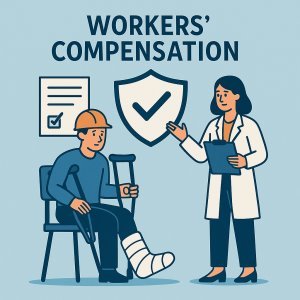
Insurance Carrier Change: Timing Your Move to Cut Workers Comp Costs
September 5, 2025
Bundling Liability and Workers’ Comp in Georgia: Savings for Security Guard Firms?
September 5, 2025In the dynamic and high-stakes habitat of healthcare facilities, hospital security guards play a crucial role in maintaining safety and order for patients, staff, and visitors. Given the unique risks these professionals encounter-from managing volatile situations to navigating complex medical settings-understanding the nuances of workers’ compensation coverage is essential for healthcare organizations. This article explores the critical considerations surrounding workers’ comp protections for hospital security personnel, outlining best practices to ensure thorough coverage, compliance, and risk mitigation within healthcare environments.
Table of Contents
- Hospital Security Guards in Healthcare Settings Risk Factors and Liability Considerations
- Navigating Workers Compensation Coverage for Hospital Security Personnel
- Best Practices for Ensuring Comprehensive Workers Comp Protection
- Implementing Training and Safety Protocols to minimize Workplace Injuries
- Q&A
- Insights and Conclusions
Hospital Security Guards in Healthcare Settings Risk Factors and Liability Considerations
Working as security personnel in hospital environments presents unique challenges that extend beyond typical security roles. Hospital security guards regularly encounter unpredictable situations such as managing aggressive visitors, handling emergency responses in sterile settings, and safeguarding vulnerable patients and sensitive health information. These factors contribute to increased risks including physical assault,exposure to infectious diseases,and high-stress conditions which can lead to injury or occupational illnesses. Understanding these hazards is vital to ensure appropriate workers’ compensation coverage that reflects the complex nature of their duties and protects both the guard and the healthcare institution.
Liability considerations in healthcare security go hand-in-hand with risk management. Hospitals must balance the need for aggressive security tactics with compliance to regulations protecting patient rights and staff safety. Liability exposure arises from incidents such as inadequate training, failure to de-escalate conflict, and insufficient protective equipment.The table below highlights common risk factors alongside key liability points to address in workers’ compensation policies:
| Risk Factor | Potential Liability |
|---|---|
| Physical confrontations with patients/visitors | Workplace violence claims, assault injury cases |
| Exposure to contagious diseases | Occupational illness claims, inadequate safety protocols |
| stress and fatigue due to long shifts | Mental health claims, performance-related liability |
| Use of force and restraint techniques | excessive force lawsuits, procedural compliance issues |
- Comprehensive training programs focused on de-escalation and infection control.
- Regular review of workers’ compensation policies tailored to healthcare security risks.
- Implementation of protective equipment and safety protocols aligned with healthcare standards.
Navigating Workers compensation coverage for Hospital Security Personnel
hospital security personnel operate in high-risk environments where the possibility of injury or illness is elevated due to the nature of their duties.Understanding the nuances of workers’ compensation coverage in healthcare settings is crucial for both employers and employees. Coverage typically extends beyond physical injuries to include mental health conditions resulting from workplace trauma, such as post-traumatic stress disorder (PTSD). It is vital to ensure that all incidents are promptly reported and documented to facilitate claims processing and protect the rights of security staff.
Key factors influencing workers’ comp eligibility for hospital security guards include the following:
- Type of Injury: Physical, psychological, or occupational illness must be work-related.
- Incident reporting: Timely filing of injury reports is mandatory for claim approval.
- Workplace Environment: Specific hazards linked to healthcare settings, such as exposure to infectious diseases, are covered risks.
- State Regulations: Variations in workers’ compensation laws may affect coverage scope.
| Coverage Element | Description | Example |
|---|---|---|
| Medical benefits | Payment for necessary medical treatment related to injuries. | Emergency care after a security incident. |
| Disability benefits | Compensation during temporary or permanent work absence. | Lost wages due to injury recovery. |
| Rehabilitation Services | Support for physical and occupational therapy. | Therapy after a workplace assault. |
| Psychological Support | Counseling for mental health issues from job-related trauma. | PTSD treatment following a violent event. |
Best Practices for Ensuring Comprehensive Workers Comp Protection
To achieve comprehensive workers’ compensation protection for hospital security guards, it is essential to establish a clear classification and risk assessment protocol. Security personnel in healthcare settings face unique hazards, including exposure to infectious diseases, patient-related violence, and emergency situations that differ significantly from other industries. Employers should conduct regular safety audits and collaborate with insurance providers to tailor policies that reflect these specific risks. Additionally, dedicating resources to ongoing training in conflict resolution, emergency response, and infection control can significantly reduce workplace injuries and claims.
Employers must also implement robust reporting and claims management systems to ensure timely and accurate handling of workers’ compensation cases. Effective communication channels between security teams, HR departments, and insurance carriers support swift incident documentation and minimize coverage disputes. Key strategies include:
- Prompt injury reporting procedures with clear guidelines for all staff
- Utilization of occupational health services for early intervention and return-to-work programs
- Periodic review of policy terms and premium adjustments to suit evolving risk profiles
| Best Practice | Benefit |
|---|---|
| Customized Risk Assessments | accurate premium pricing and risk mitigation |
| Regular Staff Training | Reduced incidents and improved safety culture |
| Efficient Claims Management | Faster resolution and decreased administrative costs |
Implementing Training and Safety Protocols to Minimize Workplace Injuries
Effectively reducing workplace injuries among hospital security personnel begins with comprehensive training programs designed to address the unique challenges of healthcare environments. These training initiatives should emphasize conflict de-escalation techniques, emergency response protocols, and situational awareness to prepare guards for potential hazards. Incorporating regular refresher courses not only reinforces best practices but also keeps staff updated on new safety standards and procedural changes within the hospital. Additionally, leveraging technology, such as simulation-based learning and interactive workshops, can significantly enhance skill retention and operational readiness.
Beyond training, establishing clear safety protocols is essential for minimizing risks.This includes implementing consistent use of personal protective equipment (PPE), enforcing proper communication channels, and conducting routine safety audits to identify and address vulnerabilities. The following table outlines key components to consider when developing these protocols:
| Safety Component | Implementation Strategy | Expected outcome |
|---|---|---|
| Access Control | Strict badge checks and visitor screening | Reduce unauthorized entry incidents |
| Incident Reporting | Immediate documentation via digital platforms | Enhanced response time and accountability |
| Health Monitoring | Regular health checks and mental wellness support | Lower injury and burnout rates |
- Proactive risk assessments to customize safety measures
- Collaborative drills involving security and healthcare teams
- clear escalation protocols to manage violent or emergency situations
Q&A
Q&A: Hospital Security Guards – Workers’ Compensation Coverage for Healthcare Environments
Q1: Why is workers’ compensation coverage crucial for hospital security guards?
A1: Hospital security guards operate in high-risk environments characterized by potential violence, exposure to infectious diseases, and physical hazards. Workers’ compensation coverage ensures that guards recieve medical care, wage replacement, and rehabilitation benefits if they are injured or become ill on the job, protecting both the employee and the employer financially.Q2: What types of injuries or incidents are most common for security guards in healthcare settings?
A2: Common incidents include assaults from patients or visitors,slips and falls due to hazardous conditions,exposure to biohazards,and repetitive strain injuries from prolonged standing or patrol activities. These risks make it imperative for security personnel to have appropriate workers’ comp protection.
Q3: How does workers’ compensation coverage for hospital security guards differ from other industries?
A3: While the core benefits of workers’ compensation remain the same, hospital security guards face unique occupational hazards such as exposure to infectious diseases and dealing with emotionally disturbed individuals. Insurance providers may accordingly tailor coverage and risk assessments to reflect the higher risk levels in healthcare environments.
Q4: What responsibilities do hospital administrators have regarding workers’ comp for security staff?
A4: Hospital administrators must ensure that all security personnel are classified correctly under workers’ compensation policies, provide adequate training and safety protocols, and promptly report and document any workplace injuries.ensuring compliance with state workers’ compensation regulations is also essential.
Q5: Can third-party security firms providing hospital security be held accountable for workers’ comp coverage?
A5: Yes.When hospitals contract third-party security companies, those firms are typically responsible for carrying workers’ compensation insurance for their employees. Though, hospitals should verify coverage to avoid liability gaps and ensure seamless protection.
Q6: How can hospitals mitigate risks and reduce workers’ comp claims among security guards?
A6: Implementing comprehensive safety training, deploying appropriate personal protective equipment (PPE), establishing clear protocols for handling confrontational situations, and maintaining a well-documented incident reporting system are effective strategies.Regularly reviewing and updating security measures also helps mitigate risks.
Q7: What should hospital security guards do promptly after sustaining a work-related injury or illness?
A7: Security personnel should promptly report the injury or illness to their supervisor, seek immediate medical evaluation if necessary, and complete all required documentation for workers’ compensation claims. Early reporting facilitates timely treatment and claim processing,minimizing potential complications.
Q8: How do workers’ compensation claims impact hospital security departments financially?
A8: Claims can lead to increased insurance premiums and can impact budgeting for security operations. Therefore, efficient risk management and a proactive safety culture are critical to controlling costs associated with workplace injuries in hospital security.
This Q&A provides a comprehensive overview of workers’ compensation considerations specific to hospital security guards, addressing operational, financial, and regulatory aspects relevant to healthcare environments.
Insights and Conclusions
understanding workers’ compensation coverage is essential for hospital security guards and healthcare administrators alike. Given the unique risks present within healthcare environments, ensuring comprehensive coverage not only protects individual employees but also supports the overall safety and operational resilience of the facility. By proactively addressing workers’ comp considerations, hospitals can foster a secure workplace, mitigate potential liabilities, and uphold their commitment to the well-being of all staff members.
“This content was generated with the assistance of artificial intelligence. While we strive for accuracy, AI-generated content may not always reflect the most current information or professional advice. Users are encouraged to independently verify critical information and, where appropriate, consult with qualified professionals, lawyers, state statutes and regulations & NCCI rules & manuals before making decisions based on this content.








